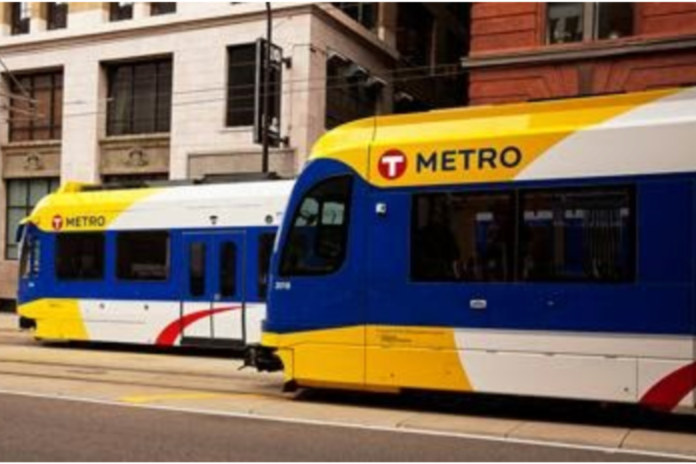A new plan proposed by Democrat legislators and supported by the unelected Metropolitan Council would eliminate criminal penalties for those who unlawfully obtain transit services and would add “transit ambassadors” to monitor light rail transit, according to a new bill introduced in the legislature this past week.
House File 3085, which outlines the new “Transit Rider Experience Program,” is authored by Rep. Brad Tabke (DFL 55A-Shakopee area) and Rep. Frank Hornstein (DFL 61A-Mpls Chain of Lakes area). The plan proposes to eliminate criminal penalties for unlawfully obtaining transit services and replace penalties with “administrative citations.” The plan also calls for the addition of an unspecified number of transit agents – dubbed “transit ambassadors” – and calls for implementing a “fare payment inspection” system.
Notably, the plan specifies the development of a transit ambassador recruitment program that includes “potential applicants who are representative of transit users, and [are] from cultural, ethnic, and racial communities that are historically underrepresented in state or local public service.”
The plan also adds a “civil process” layer where those issued administrative citations can contest their citation. The bill suggests that the [Metropolitan Council] could employ a council employee not
associated with its transit operations to hear and rule on challenges to administrative citations
or that it may contract with another unit of government or a private entity to provide the service.
A recent report on the new proposal said that, currently, someone caught riding without paying the fare could be subjected to $180 misdemeanor penalty, but quoted Rep. Tabke as saying that only “a tiny fraction of such cases are prosecuted.” Metropolitan Council Chairman Charlie Zelle weighed in saying, “[i]t’s not just. It’s not fair,” in reference to the current fine amount.
The bill proposes to reduce the penalty for non-payment of a fare to a petty misdemeanor, which is not considered a criminal offense, and the person cited would be assessed a fine between $35 to $100 that could be paid online.
The report also stated that transit ambassadors “would ensure that those who can pay [the fare] are doing so,” but no details were given as to how ambassadors would go about determining a person’s ability to pay the fare as they’re attempting to board public transit.
The bill does not outline what the added costs would be for the new transit ambassadors or the associated administrative and fine collection costs. However, Rep. Tabke said that as more people pay to ride, that would generate additional dollars. He said his bill sets a goal of having 10% of transit riders inspected for fare compliance by 2024.
SERIOUS INCREASE IN TRANSIT-RELATED CRIME
The plan comes in the wake of several reports of a serious increase in violent transit-related crimes including a stabbing homicide on Jan. 23 on a Blue Line light rail train near the Mall of America, as well as the death of a community elder after an assault in November following a confrontation on a Metro Transit bus.
ALSO READ: Teens Attack Off-Duty TSA Agent on Blue Line LRT Train
Senate Republican legislators recently noted transit crime within their “Vision 2020” list of agenda items they wish to address in the upcoming legislative session which is set to begin on Feb. 11.
Responding to concerns about transit-related crime, Met Council Chairman Zelle said in the recent report that the transit ambassadors proposed in the plan would address a trend of fewer people paying fares, but more importantly they would create a safer and more welcoming atmosphere and deter people from criminal behavior in their presence. The bill itself, however, makes no mention of specifically addressing crime or public safety concerns or how the transit ambassadors may be deployed in addressing those issues.
Rep. Paul Torkelson (R-Hanska), the Republican lead on the House Transportation and Finance Policy committee said he hasn’t looked through the new Democrat proposal, but he plans to introduce a bill instructing the Met Council to bring in outside experts to evaluate light-rail safety and make recommendations.
ALSO READ: Metro ‘Green Line’ Abetting Violent Crime Across City: St. Paul Police
Torkelson said in November that lawmakers will be evaluating several proposals to enhance rider safety on public transit that could include adding barriers or turnstiles at boarding locations, increasing Metro Transit officers and/or fare inspectors, creating criminal penalties for loitering on a light rail station platform and allowing law enforcement to ticket those loitering who haven’t paid for a fare.
Last week Torkelson introduced a bill that calls for the Met Council to contract with an independent entity to perform a comprehensive assessment of public safety on the light rail transit system and options to increase safety. The proposal seeks to require identification of likely causes of crime rate increases on the light rail transit system as well as review of methods to reduce fare evasion, loitering, and behavior of individuals and groups that negatively impact the rider experience.
In contrast to the Democrat’s proposal, Torkelson’s bill seeks to require increased penalties for violations while on the light rail train system and would mandate the issuance of citations rather than warnings.
Sponsor this content. You can help ensure that Alpha News can continue to publish important public safety news and information. Email: pbagnpghf@nycunarjfza.pbz.
###
Minnesota Crime Watch & Information publishes news, info and commentary about crime, public safety and livability issues in Minneapolis, the Twin Cities and greater Minnesota.

















